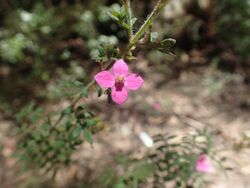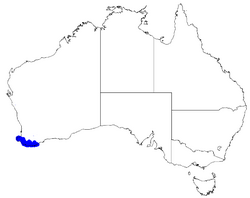Biology:Boronia gracilipes
| Karri boronia | |
|---|---|

| |
| Boronia gracilipes in the Australian National Botanic Gardens | |
| Scientific classification | |
| Kingdom: | Plantae |
| Clade: | Tracheophytes |
| Clade: | Angiosperms |
| Clade: | Eudicots |
| Clade: | Rosids |
| Order: | Sapindales |
| Family: | Rutaceae |
| Genus: | Boronia |
| Species: | B. gracilipes
|
| Binomial name | |
| Boronia gracilipes F.Muell.[1]
| |

| |
| Occurrence data from Australasian Virtual Herbarium | |
Boronia gracilipes, commonly known as karri boronia,[2] is a plant in the citrus family, Rutaceae and is endemic to the south-west of Western Australia. It is an erect, spindly shrub with compound leaves and pink, four-petalled flowers.
Description
Boronia gracilipes is an erect, spindly shrub that usually grows to a height of 0.3–1.2 m (0.98–3.9 ft) tall, its stems covered with long, soft hairs. It has flat, compound leaves less than 10 mm (0.39 in) long, usually with five or seven lance-shaped to oblong leaflets. The flowers are pink and arranged singly in leaf axils on a pedicel 10–30 mm (0.39–1.2 in) long. The four sepals are triangular to almost round and overlap at their bases. The petals are about 8 mm (0.31 in) long and glabrous with their bases overlapping. The stigma is large and oval, almost without a style. Flowering occurs mainly from July to December.[2][3][4]
Taxonomy and naming
Boronia gracilipes was first formally described in 1860 by Ferdinand von Mueller and the description was published in Fragmenta phytographiae Australiae.[5][6] The specific epithet (gracilipes) is derived from the Latin words gracilis meaning "slender"[7]:791 and pes meaning "foot".[7]:343
Distribution and habitat
Karri boronia grows in shady places in gullies and granite outcrops in the Esperance Plains, Jarrah Forest and Warren biogeographic regions of Western Australia.[2]
Conservation
Boronia gracilipes is classified as "not threatened" by the Western Australian Government Department of Parks and Wildlife.[2]
References
- ↑ "Boronia gracilipes". https://biodiversity.org.au/nsl/services/apc-format/display/60035. Retrieved 16 March 2020.
- ↑ 2.0 2.1 2.2 2.3 "Boronia gracilipes". FloraBase. Western Australian Government Department of Parks and Wildlife. https://florabase.dpaw.wa.gov.au/browse/profile/4422.
- ↑ Bentham, George; von Mueller, Ferdinand (1863). Flora Australiensis (Volume 1). London: Lovell Reeve and Co.. p. 318. https://www.biodiversitylibrary.org/item/3669#page/376/mode/1up. Retrieved 2 February 2019.
- ↑ "Species of Boronia". Royal Botanic Gardens Victoria. https://keybase.rbg.vic.gov.au/keys/show/1801. Retrieved 2 February 2019.
- ↑ "Boronia gracilipes". APNI. https://id.biodiversity.org.au/instance/apni/464810. Retrieved 2 February 2019.
- ↑ von Mueller, Ferdinand (1860). Fragmenta phytographiae Australiae (Volume 2). Melbourne: Victorian Government Printer. p. 99. https://www.biodiversitylibrary.org/item/7219#page/103/mode/1up. Retrieved 2 February 2019.
- ↑ 7.0 7.1 Brown, Roland Wilbur (1956). The Composition of Scientific Words. Washington, D.C.: Smithsonian Institution Press.
Wikidata ☰ Q15393745 entry
 |

